#condottieri
Explore tagged Tumblr posts
Text

by mosssacannibalis
162 notes
·
View notes
Text



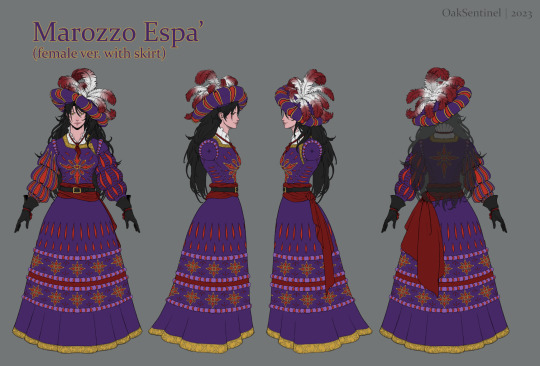
Reference sheets I made for Marozzo Espa's future vtuber model
66 notes
·
View notes
Text
Il 19 gennaio 1459, Roberto Sanseverino tornò a Milano dopo un viaggio in Terra Santa.
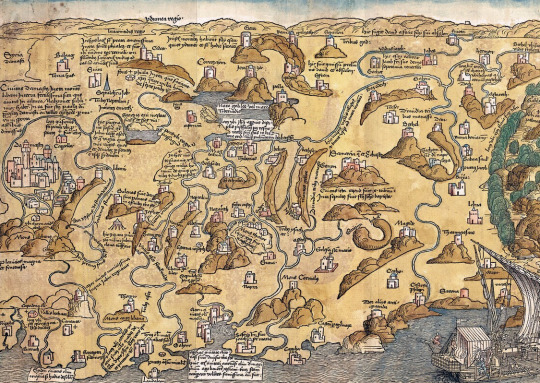
La cronaca "Viaggio in Terrasanta fatto e descritto per Roberto da Sanseverino" racconta il ritorno epico.
Nel libro "Roberto Sanseverino. Condottiero del Rinascimento italiano tra arte militare e politica", il capitolo "Il pellegrinaggio in Terra Santa" svela i dettagli di questo affascinante viaggio.
https://www.robertosanseverinocondottiero.com/2024/01/il-ritorno-del-sanseverino-dal-viaggio.html
#Eugenio larosa#robertosanseverino#medioevo#libro storico#biografia#15th century#condottieri#enionline#pellegrinaggio#pilgrim#pilgrimage#medieval#libridaleggere#saggio#storia medievale
8 notes
·
View notes
Text
jedimaesteryoda Would their parcel post and messenger services be particularly useful for the condottieri side, ie sending messages to commanders quickly across distances as well as cultivate connections in cities for intel?
Yes, in a number of ways!
In the interests of full disclosure, I should say that I borrowed this idea from Dorothy Dunnett's House of Niccolò historical novels, but it made so much sense for a mercenary company that I had to use it. It also fits a historical model, as we can see from the Tasso family from Lombardy who started their first courier service on the lucrative route between Milan, Venice, and Rome, which they then extended up to Vienna and over to Brussels - which eventually got them an Imperial knighthood, command of the Kaiserliche Reichspost, lands from Spain to Brussels, and eventually baronial, comitial, and then princely titles.

In a world in which travel was relatively rare and could be quite dangerous, getting letters and valuable goods safely to their destination could be quite difficult, and while one could contract with pre-existing merchant caravans heading in the right direction they weren't exactly fast or regular. Hiring mercenaries (often originally mercenaries who had been working as escorts for said caravans) to make the trip independently made a lot of sense, because they already had experienced cavalrymen who knew how to scout and ride cross-country at speed, and could defend your property by force of arms.
For their part, as you said, developing a postal and parcel service was a good way for mercenary companies to improve their communications, intelligence, and logistics capacities for when they later needed to move armies across those same routes.
A Guildsman Goes Forth to War, Inciting Event and Main Characters
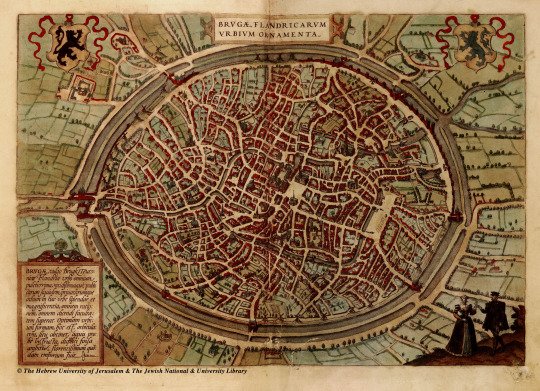
Inciting Event:
The city of Brugghe is one of the largest and richest in all of Europe. It is a center of vertically- and horizontally-integrated textile production in wool, cotton, linen, and silk, and the people wear their reputation on their richly-dyed, patterned, and embroidered backs. As the northernmost of the cloth fairs that stretch all the way from Gallia to the southernmost reaches of the ancient Kingdom of Lotharingia), and the confluence of the North Sea and the Rhine, Brugghe is a natural entrepôt between the merchants of the Hansa and the commercial republics of the Lega, and thus one of the leading financial centers on the Continent.
A bustling cosmopolis of two hundred thousand souls, with a lively Foreign Quarter representing merchants and bankers from Portugal and the Basques to a half-dozen Lega republics to representatives of the Sublime Porte. In Brugghe, even the poorest and least educated rural migrants are bilingual (even if they insist on speaking only Gallician or Imperial), a respectable burgher is expected to speak at least four, and a man is considered educated only if he speaks six. A center of the printing trade (and thanks to its dyeing industry, a lively art scene), it is an unusually literate city, only more so thanks to the recently-established University.
For the last thirty years, the city has been ruled by the tolerant but firm hand of Baron Froederick van Zonder Vrees, although for the last ten the day-to-day governance has been conducted in his name by his significantly younger wife due to a long and lingering illness that has forced the Baron to a sickbed and (accoridng to reports) to his deathbed. Although by all reports a loving and capable partnership, the Baron and Baronness are childless. If the Baron should pass, what shall become of Brugghe?
Main Characters:

Margrit van Zonder Vrees (née Marguerite de Corbenic), Baronness of Brugghe
The daughter of a noble family from Brittany (with extended ties to Cornwall and south Wales) with a strong Gentry heritage of elfkind, Margrit (or Marguerite, depending on whether she's speaking in Gallician or Imperial) was sent to the Burgundian court following a romantic indescretion in her youth, where she became one of the court beauties and a poetess beside, reknowned for the strength of her Glamour and wit alike.
At the age of twenty, she was married to the significantly older Froederick van Zonder Vrees as part of diplomatic efforts to maintain Gallician/Imperial harmony in the Low Countries. Despite the age gap between the two, Froederick came to respect his bride's surprisingly well-educated mind and supported her patronage of the newly-founded University and the city's cultural industries, while Margrit came to admire her husband's commitment to light-handed and tolerant governance that had seen Brugghe reach heights of prosperity that it had not seen since the collapse of the Flemish revolt.
When Froederick began to fall ill, Margrit smoothly gained influence within the Baronial Council of State that governed the city until she became the Regent in all but name. At the outset of A Guildsman Goes Forth to War, Marguerite's dilemma is that she has no child to pass the title to upon her husband's death - and due to the complicated mix of family intermarriages, there will be claimants from both the Kingdom of Gallia and the Sacrum Imperium.
[Need to find a good picture]
Ludovico "Malasangue," Captain-General of the Bonafortuna Mercenary and Insurance Company, graduate of the University of Padua, and guildsman of the Arte dei Giudici e Notai of Florentia.
The younger son of the Bilancia banking family, Ludovico was the subject of considerable scandal, for from birth it was quite clear that he was Gentry-born of some rare and unknown lineage, while neither his mother nor his father had any such connexions. A brawler of violent temper, Ludovico was packed off to Padua by his decidely chilly and aloof father to avoid embarrassment - and to ensure that he would have a career that would avoid any interference with his older (some would say "legitimate") brother's inheritance of the family business.
The curriculum at the great university of the hills seemed to calm the intemperate youth and Ludo proved to be quite adept at both the Old Learning of the trivium et quadrivium, the New Learning of the studia humanitatis, and his chosen degree in Law. It was widely expected that, upon his graduation and return to the city of his birth, he would take up a respectable and conventional career in the leading Arti Maggiori. Thus, it came as something of a surprise when instead Ludovico and some of his university friends announced the formation of a new kind of mercenary company.
The Bonafortuna Mercenary and Insurance Company would be made up not of impoverished noblemen and ambitious peasants, but entirely of urban guildsmen recruited from among the Lega. In times of peace, the Company would make its income from providing a comprehensive suite of services from messenger and parcel post to commercial and residential insurance to private security, to individual and municipal clients alike - with significant discounts for joint customers of the condottieri side of the business.
#renaissance fantasy#fantasy genre#a guildsman goes forth to war#mercenaries#mercenary companies#renaissance history#postal service#condottieri#creative writing
35 notes
·
View notes
Text
The Eric Adams thing could work out really well. These days, they usually won't let you hire yourself out as a mercenary in a land war against a city-state and behead the militia supporting a liege lord sworn to the perfidious Turk with a cavalry sabre.
But, you know, maybe!
6 notes
·
View notes
Text

i'm tormenting the group chat with my niche special interest and the tv show i would turn it into if i could make a tv show
1 note
·
View note
Text
sigh. do i need more ideas? no. do i have more ideas? of course
abbott!valentino receives a very curious guest from the county of barcelona who claims that he's going on a holy pilgrimage to rome. all is well and good. problem: they are more or less virtually isolated due to winter and the fact it is the handwavy late 1300s and you have new outbreaks of plague every so often.
and said guest always has a convenient excuse to avoid mass and the sacraments.
(and god is he handsome. no less fair than an angel. the kind of face that inspires nuns to dream of being taken over by the holy spirit. dark-eyed and intense. laughs too loudly in the quiet of the monastery, shameless. he clasps valentino's hand in his own and kisses it, mouth hot against his fingers. thank you for your generosity, father.)
cue demon!marc. who now has a very particular interest in getting one immortal soul to stumble. just a little, if you will.
more under the cut because i have Thoughts tm.
so. this is no particular monastery. you can think san giorgio in venice, or maybe pomposa near ferrara. in short: very rich, very influential, lots of land. suitable for one politically savvy valentino rossi, of course, but still firmly under the ora et labora rule.
this is a place of contemplation sanctifying work. if valentino's table is always, well, generous, it's only because he's providing to his guests who don't adhere to his order's strict frugality. if he's a great hunter and rider, it's only to provide to his flock. if he walks around with a mitre ornamented with gold, it's because of the generosity of the good folk of christ.
and marc finds it hilarious. he so dearly loves hypocrites, liars and holy men. he wants this one all for him.
it's no hardship, to distract valentino from properly attending the hours (he's simply sampling from the abbey's excellent wine, they're beyond skilled, really, his most sincere compliments. and if his mouth is stained dark and inviting, well, wasn't it god who made men beautiful).
to go hunting with him and smile up once they break off from the rest of their entourage, his hands stained with blood, his eyes fiery. you're a remarkable marksman, valentino says, strangled, while marc kneels on the snow before him, watching the poor hart bleed to death.
and listen, valentino may be more prince than clergyman (it's the right era for that. there are anti-popes in avignon. the medicis, sforzas, borgias, the viscontis, della roveres, orsinis, borghese, etc, etc, etc are either right around the corner or there already. it's the time of the cardinal-nephews) but he isn't stupid.
he keeps getting those letters from luca (maybe a condottieri. maybe a local nobleman. if this is venice, i keep seeing him as serving one of the avogadori de comùn, aka public prosecutors, or in the quarantia) about how the crops are failing, and the plague is getting worse, and people are gettting a little wild. more crimes. more violent crimes.
the local confessor is very worried about the souls of valentino's monks, too. he cannot get in detail, no, but many are experiencing doubt and temptation. strange dreams. unwilling desires.
valentino smiles, thinly. these are trying times, he says, the very picture of sorrowfulness in his artfully dyed habit. he's thinking about—how he dreams at night. tanned hands braced against his chest. the glimspe that he caught of marc's thighs, smooth, strong. how exactly he thought about extracting payment, after marc pressed a silver necklace into his hands, eyes downcast, father, i have nothing else to give, but take this, i don't wish to impose on the generosity of the servants of christ.
#thank you name of the rose#i didn't need this and yet#anyway if you want to know more about demon!marc tempting a very bad priest valentino i'm always up for it#anyway pecco is valentino's claustral prior (his second in command) and he's fucking SUFFERING#and marc has a very ill-tempered somewhat violent horse that no one can get close to (it's his honda baby)#i haven't nailed down the rest of the academy yet#rosquez#abbey au
31 notes
·
View notes
Text

🍀
"A ciascuno di voi è riservata una persona speciale. A volte ve ne vengono riservate due o tre, anche quattro. Possono appartenere a generazioni diverse. Per ricongiungersi con voi, viaggiano attraverso gli oceani del tempo e gli spazi siderali. Vengono dall'altrove, dal cielo. Possono assumere diverse sembianze, ma il vostro cuore le riconosce. Il vostro cuore le ha già accolte come parte di sé in altri luoghi e tempi, sotto il plenilunio dei deserti d'Egitto o nelle antiche pianure della Mongolia. Avete cavalcato insieme negli eserciti di condottieri dimenticati dalla storia, avete vissuto insieme nelle grotte ricoperte di sabbia dei nostri antenati. Tra voi c'è un legame che attraversa i tempi dei tempi: non sarete mai soli..."
Brian Weiss
#smokingago
173 notes
·
View notes
Text
youtube
The Golden Age of the Condottieri
from SandRhoman History
19 notes
·
View notes
Text

Caro, non dimentichiamo che le piccole emozioni sono i grandi condottieri delle nostre vite e che a queste noi obbediamo senza saperlo.
- Vincent Van Gogh, Lettere a Theo
Field of Poppies by Vincent Van Gogh
Il 29 luglio 1890 moriva il pittore olandese Vincent Willem Van Gogh, a soli 37 anni.
@occhietti
23 notes
·
View notes
Text
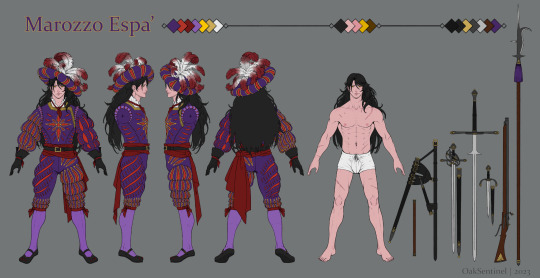
Reference sheet commission for Marozzo Espa'
7 notes
·
View notes
Text
Magnifico Signore. Pino III Ordelaffi, l'ultimo Signore di Forlì
Magnifico Signore. Pino III Ordelaffi, l’ultimo Signore di Forli Autore: Sergio Spada Editore: Edizioni Balestra Maurizio, Collana “Storia e Tradizione”. Anno di pubblicazione: 1998 “Magnifico Signore. Pino III Ordelaffi, l’ultimo Signore di Forlì” di Sergio Spada ci riporta nella Romagna del Quattrocento, un periodo caratterizzato da famiglie signorili impegnate in continue lotte e alleanze per…
0 notes
Note
Please tell me more about neighbourhood PMCs in renaissance Italy
It would be my pleasure! (My research into this owes a lot to the excellent Power and Imagination: City-States in Renaissance Italy by Lauro Martines.)
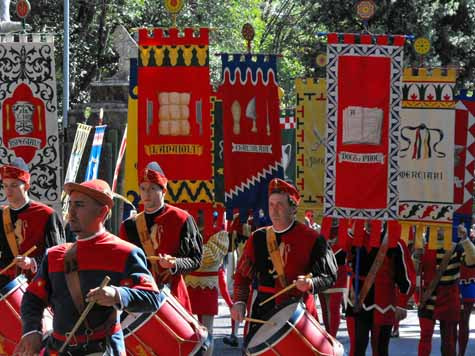
The first thing to note that, unlike the condottieri, these were not private military companies. Rather, the neighborhood military companies (in the sense of a military unit, rather than a profit-making entity) were self-defense organizations formed as part of a centuries-long political struggle for control over the urban commune between the signorile (the urban chivalry)/nobilita (the urban nobility) and the populo (the guilded middle class, who claimed to speak on behalf of "the people").
This conflict followed much the same logic that had given rise to the medieval commune in the first place. Legally, the communes had started as mutual defense pacts between the signorile and the cives (the free citizens of the city) against the rural feudal nobility, which had given these groups the military and political muscle to push out the marquises and viscounts and barons and claim exclusive authority over the tax system, the judicial system, and the military.
So it made sense that, once they had vanquished their enemies and established the commune as the sovereign, both sides would use the same tactic in their struggle over which of them would rule the commune that ruled the city. The signorile and nobilita formed themselves into consorteria or "tower societies," by which ancient families allied with one another (complete with dynastic marriage alliances!) to build and garrison the towers with the knights, squires, men-at-arms, and bravi of their households. These phallic castle substitutes were incredibly formidable within the context of urban warfare, as relatively small numbers of men with crossbows could rain down hell on besiegers from the upper windows and bridges between towers, even as the poor bastards on the ground tried to force the heavy doors down below.
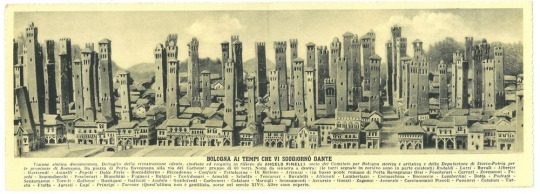
To combat noble domination of communal government, achieve direct representation on the political councils, establish equity of taxation and regulate interest rates, and enforce legal equality between nobility and citizenry, the populo formed themselves into guilds to build alliances between merchants and artisans in the same industries. However, these amateur soldiers struggled to fight on even footing with fully-trained and well-equipped professional soldiers, and the guild militias were frequently defeated.
To solve their military dilemma, the populo engaged in political coalition-building with the oldest units of the urban commune: the neighborhoods. When the cities of medieval Italy were originally founded, they had been rather decentralized transplantations of the rural villages, where before people had any conception of a city-wide collective their primary allegiance was to their neighborhood. As can still be seen in the Palio di Siena to this day, these contrade built a strong identity based on local street gangs, the parish church, their traditional heraldry, and their traditional rivalries with the stronzi in the next contrade over. And whether they were maggiori, minori, or unguilded laborers, everyone in the city was a member of their contrade.
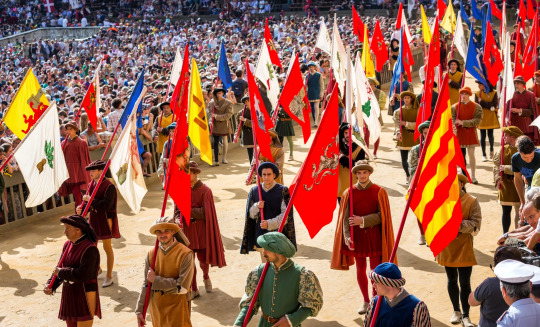
As Martines describes, the populo both recruited from (and borrowed the traditions of) the contrade to form their armed neighborhood companies into a force that would have the manpower, the discipline, and the morale to take on the consorteria:
"Every company had its distinctive banner and every house in the city was administratively under the sign of a company. A dragon, a whip, a serpent, a bull, a bounding horse, a lion, a ladder: these, in different colors and on contrasting fields, were some of the leitmotifs of the twenty different banners. They were emblazoned on individual shields and helmets. Rigorous regulations required guildsmen to keep their arms near at hand, above all in troubled times. The call to arms for the twenty companies was the ringing of a special bell, posted near the main public square. A standard-bearer, flanked by four lieutenants, was in command of each company."
To knit these companies organized by neighborhood into a single cohesive force, the lawyers' guilds within the populo created a state within a state, complete with written constitutions, guild charters, legal codes, legislative and executive councils. Under these constitutions, the populo's councils would elect a capitano del popolo, a professional soldier from outside the city who would serve as a politically-neutral commander, with a direct chain of command over the gonfaloniere and lieutenants of the neighborhood companies, to lead the populo against their noble would-be overlords.
And in commune after commune, the neighborhood companies made war against the consorteria, taking the towers one by one and turning them into fortresses of the populo. The victorious guilds turned their newly-won military might into political hegemony over the commune, stripping the nobilita of their power and privilege and forcing them either into submission or exile. Then they directed their veteran neighborhood companies outward to seize control of the rural hinterland from the feudal aristocracy, until the city had become city-state.
(Ironically, in the process, the populo gave birth to the condottieri, as the nobility who had lost their landed wealth and political power took their one remaining asset - their military training and equipment - and became professional mercenaries. But that's a story for another time...)
#history#historical analysis#renaissance history#renaissance fantasy#medieval cities#city-states#urban communes#guilds#city charters#guild charters#mercenaries#nobility#artisans#burgher rights#merchants
154 notes
·
View notes
Text

"Sfortunato il luogo che ha bisogno di condottieri."
#writing#books & libraries#poetry#writers on tumblr#writer#poets on tumblr#prose#leggere#scrivere#pensieri#aforisma#amore#aforismi#scrittura#sentimenti#scritti#scrittori#emozioni#pensiero#bertolt brecht#lettori#letteratura#citazioni letterarie#lettura#critica letteraria#citazioni#citazioni di vita#citazioni libri#citazioni d'amore#citazione tumblr
10 notes
·
View notes
Text

THE BROTHERS PAOLO AND VITELLOZZO VITELLI
man. the fucking. cycles of violence going on here. war, condottieri brothers, the execution of paolo vitelli (but the on the matter of guilt: questionable! no proof besides the absence of potential violence, but what conspiracy-betrayal wants to leave behind proof? torture and execute him anyway. maybe machiavelli has a point! unfortunately you left a surviving brother), the congiura della magione, all of it coming together at the strage di senigallia. just blood and gore and war all the way down, never stopping for a breather, already on to it's next battlefield. also malaria is there!
in other news! it turns out if you want to draw a comic about the strage di senigallia, you have to figure out designs for all the people in the room, but if you draw vitellozzo, you also have to draw his brother because he's like. there. in a dead way. something something vitellozzo's desire to avenge his brother manifesting in his desire to brutalize florence for their role in his brother's death.
that said, I did not want to draw military armor for an illustration that was partially designed to test out some splatter brushes. in the future though���.I will have to revisit that visual…..
#italian renaissance tag#bdhsehrhghhhh#i thought about doing classicstober for about thirty seconds except i mostly draw roman politicians and i wouldn't do a roman#politicians october if there was one#what i will do. for some reason. is a comic about the senigallia massacre. because i have exactly one panel i want to draw SO bad#but in order to get that one panel. i need TEN PAGES OF NARRATIVE so the pay off will be satisfying. aughhrhghdhdhguehs#blood cw#anyway i dont think that paolo was conspiring. its just that the absence of decisive violence in war when you have the upper hand is like#weird. for everyone watching. like what are YOU doing man.#something about. uh. cesare's involvement in all of this is also compelling? the way we go to cesare and then against him#and cesare coming down HARD. take no prisoners. only their heads.#god what i would've done for s4 of showtime's borgias to see how they would do the senigallia massacre.............weeping......#anyway. blah. whether or not this comic gets done in octber is a huge question. but we gotta. get started on it. for#it to someday get finished. you know. AUGH. i need to do environment studies again#the renaissance has a vibe and i have yet to pin down the architectural vibe when i try to draw it. SOMEDAY. someday....#related to all of this (its not) i feel ethically obligated to do some kind of narrative justice to so many figures that were in AC2
133 notes
·
View notes
Text
Screenshots of Gale and Draxin throughout the game, I just finished the game today... man, what game, even in Explorer it challenged me. But... still, so good. I loved the characters, story... OST, damn, the OST. And of course... romance. ;)
Draxin can´t do magic but it didn´t stop him trying with Gale.

Timelessness of lovers, that most beautiful of fantasies. "

At Waterdeep.



Love in Weave.

Relief after fight with Myrkul, Draxin dreaded whatever Gale was gonna blow himself up along the others. ( Forehead touch killed me! And it felt so fitting and I love how gentle Draxin can be. )

Perfect score in love test.

Onboard magic boat, Draxin convinced that Karsus Crown is too dangerous to keep and Gale is enough for Draxin as he is. And by now Dragonborn had grown to realize one thing... ambition is poison. ( Handholding also killed me. I´m softie, okay? )

Waking up together after defeat of Netherbrain. ( Still, fuck that fight, the dragon, the countermeasures and tentacles. Ugh. )

Proposal, Draxin is now Draxin Dekarios.



Kiss at Reunion party. Gale is now Professor Dekarios and Draxin is: Scarlet chief of condottieri. ( Leader or member of troop of mercenaries, especially in Italy. I didn´t want to use word mercenary directly. ) His organization works for good of people, they won´t allow people like Absolute use them to their own selfish purposes.

Clothes, home and party.


Happy ending overall, I´m in tears.
Now, remember people, don´t lose the power.
#baldur's gate 3#bg3#baldurs gate tav#bg3 oc#dragonborn#my screenshots#galemance#gale x tav#draxin#bg3 tav
4 notes
·
View notes